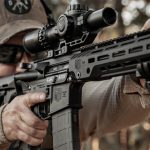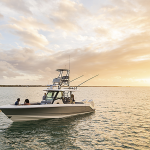Footstar, Inc. filed a motions Friday in U.S. bankruptcy court to close “in the near term” 165 underperforming stores, including all of its 88 Just For Feet stores and 77 of its 429 Footaction stores. The motions included an “emergency” request for authorization to hold GOB Sales at these locations. Bids from potential liquidators are expected my March 11 ahead of a proposed March 16 auction date.
The company has invited “most, if not all, nationally recognized liquidation firms to be part of the process, including Buxbaum Group, Gordon Brothers, Great American, Hilco Retail Trading, The Nassi Group, The Ozer Group and SB Capital. The motions indicated the use of such forms was required to “maximize the value of the inventory in the stores”. Each bid mist be accompanied by a 5% “earnest money” deposit, while the winning bidder must pony up 10% of the winning bid “within 24 hours of the auction”.
Footstar further argued that moving the merchandise to their other locations was less preferable because of “the inordinate expenses involved.
Dale Hilpert, company chairman, president and CEO, said the company is working to develop a long-term business strategy that will form the basis of a Plan of Reorganization. He said that the action to close the stores was “in the best interests of the Company and its creditors to take immediate action to reduce losses in the Company's Athletic segment” and that the action is “a critical component in Footstar's successful reorganization”.
The company expects the GOB sales to commence “shortly after Court approval is received” and are expected to be completed by summer.
It was less than three weeks ago that Footstar got the aisles jumping at the WSA show when it announced that it was “pursuing a number of alternatives to obtain necessary liquidity and restructure its debt”. Footstar, Inc. finally pulled the trigger Tuesday, filing voluntary petitions with the U.S. Bankruptcy Court for Southern New York for reorganization under Chapter 11 of the U.S. Bankruptcy Code. The action covers Footstar, Inc. and “substantially all” of its 2,534 direct and indirect subsidiaries. The company had a busy day in court Wednesday arguing the merits of more than 20 motions that are meant to expedite the process a bit.
Footstar received interim court approval to access a new $300 million debtor in possession (DIP) financing package that was committed to it by a bank group led by Fleet National Bank and GECC Capital Markets Group, Inc. This credit facility is now available to the company, along with existing cash and cash flow from operations, to help fund operations during reorganization.
The DIP financing will be used primarily to replace pre-petition revolvers and other debt, which in this case involves approximately $223 million in loans and outstanding LCs, and approximately $50,000 in past due interest and $200,000 in unpaid bank fees. Fleet National Bank was the lead lender for both the pre- and post-petition revolvers. The balance of almost $80 million remaining under the DIP financing, will be used for working capital, LCs, CapEx, and “other general corporate purposes”.
Judge Adlai S. Hardin also granted interim approval for all other “first-day motions” that Footstar made, including the motion granting vendors administrative expense priority status for post petition delivery of goods. In addition, the Court gave final approval for a motion authorizing the company to continue to pay active employees in the normal manner and continue all employee health and benefit plans. Those two pieces should enable Footstar to run the business close to normal for now.
The company had also made a motion with the court for Joint Administration of the cases, a motion we expected to be granted unless the presiding judge was a masochist. Combining all 2,500+ cases was a no-brainer.
The company also received interim approval for its motion for Adequate Protection with respect to Kmart Corporation, basically a deal negotiated pre-petition to keep the revenue flowing between the two partners during the reorganization process. For those unfamiliar with the Footstar/Kmart relationship, Footstars Meldisco division operates roughly 1,500 footwear departments in Kmart stores.
Each footwear department is set up as a separate corporation and subsidiary of Footstar, Inc. Footstar has 100% interest in 23 of the departments and has a 51% controlling interest in the balance of the departments with Kmart owning the other 49%.
Other motions were made Authorizing Payment to Foreign Creditors, which are owed approximately $50.8 million, or roughly 54.8% of total trade debt of $92.7 million. Keeping the factories rolling in product will be critical for the Meldisco side of the business even as terms tighten elsewhere. Foreign Creditors make up roughly 86% of Meldisco trade debt of about $59 million.
The Athletic division listed $34 million in trade debt at filing, with Nike topping the list with roughly $19.4 million, Reebok with just under $4.0 million and New Balance north of $2.9 million. Rounding out the trade debt for the company are Asics and K-Swiss, each with approximately $1.4 million listed, Implus Corporation (Sof Sole) with $900k, adidas with $800k, Timberland at $700k, and Fila listed at approximately $550k.
One interesting note was that Nike was the only debt listed as “Disputed and Unliquidated”, where all other debt was listed as just “Unliquidated”.
One of the more unfortunate listings in the debt table included the severance package for former JFF chief, Jeff Gordon, which is listed at more than $500k. Lets hope Jack Bellini took his in a lump sum when he left recently.
In his Affidavit filed with the court Hilpert pointed to the issues that brought Footstar to this point. He blamed declining sales over the last few years and mounting operating losses as key contributors.
He stated that Just for Feet has “operated at a loss” since Footstar acquired it back in March 2000 for $73 million. He also said “numerous” Footaction stores “have been operating at a loss”.
Also highlighted was the $59 million acquisition of the J. Baker leased footwear departments and their subsequent failure due to the “financial distress” of their host retailers, especially Ames Department Stores. The exit of the J. Baker business cost Footstar $200 million in annual revenues, while the two acquisitions increased debt by a like amount.
To make matters worse, Kmart closed 600 stores as a result of their own Chapter 11 bankruptcy, which represented another $300 million in lost Meldisco revenue. The Kmart BK was said to have “further eroded” Meldisco revenues from “significant” foot traffic declines at the stores that remained open.
Hilpert said the internal investigation of accounting errors, which will result in a $46 million reduction in earnings over the five and one-half period under review, has cost Footstar more than $15 million in fees, not to mention “significant management attention and resources”. KPMG, the accounting firm that has been at the center of the audit, is listed as an unsecured creditor with about $1.0 million in claims.
Lastly, Hilpert said that “crucial domestic vendors” made “significant reductions in available trade credit” to Footstar by the end of 2003 due to the NYSEs suspension and subsequent de-listing of FTS shares, the lack of public financials, and the “continued decline of company sales”.
Hilpert will have an easier time pleading his case than most CEOs as the real issues occurred on Mickey Robinsons watch. But Hilpert outlined his unique capabilities to turn this ship around, pointing to his tenure at Foot Locker , Inc. from 1995 to 2001 when he “oversaw the out-of-court restructuring of its worldwide athletic shoe retail operations”.
He indicated that based on his experience in the footwear and retail industry, “I am in a position to provide the leadership necessary” during the bankruptcy.
We cant forget that this company represents a big chunk of footwear business in our industry. Meldisco has operated the footwear departments of Kmart stores for more than 30 years and generated revenues of approximately $1.0 billion in 2003. The 519-store Athletic division posted revenues of approximately $973 million in 2003.
For the most part, the Footaction stores are still well-positioned in most locations. The move Friday only impacts 18% of doors, but industry watchers estimate up to 25% could go away. No, some of the suburban locations dont make sense with the urban mix and overall “flava” in the stores. These would have to be the focus.
The best result of this latest move is the ability to jettison the bad Just for Feet leases, an anchor that reportedly totals in the $240 million neighborhood.
The issue that may not go away anytime soon may well be the Kmart situation with Meldisco. There are no positive indicators that the discount also-ran, which has lost much of its share to Wal-Mart and Target, will make it in the long run.
Ironically, Meldiscos fate may well be in the hands of a the 12 citizens that found Martha Stewart guilty on all counts on Friday. Kmart, which has a long term deal with Stewart for products bearing her name, may also suffer as a result of the convictions. It is doubtful she could mount a comeback even if she skips jail time, which many legal experts see as unlikely. Decreased Kmartha traffic could hurt shoe sales.
In what has become footnote to this story, the company is still working with KPMG to complete its audit. It failed to meet its most recent deadline with the banks on February 27, a date which also marked their de-listing from the NYSE.
We think we understand a little more clearly why the audit has taken so long and much of it appears to be the way the company was structured. Each store or leased department is set up as its own corporation, owns its own inventory, and is a guarantor of the pre-petition revolver.
One could only imagine the accounting nightmare that ensues when you need to track store-to-store shipments, apply payment against drop-ships, etc
One vendor told us that a $100 rounding error could take weeks to track down through the subsidiary structure. The same issue may have also affected due diligence efforts associated with any potential suitors. The company has proven that its accounting procedures leave much to be desired and anyone looking to acquire the business would need to conduct a lengthy investigation of their own.
The process would have apparently taken too long relevant to where Footstar was in their cycle and they ended up having to pull the rip cord.
Perhaps this will give them a chance to catch their breath, get a few governing bodies off their back, and maybe put the recent past behind them so they can look forward.
>>> Will the dumping of the bad leases now make this a more attractive strategic buy???
>>> It would be helpful is they could use the process to consolidate their subsidiaries to make it easier to manage the accounting
>>> Will this help us close the Just for Feet chapter in the industrys history???















